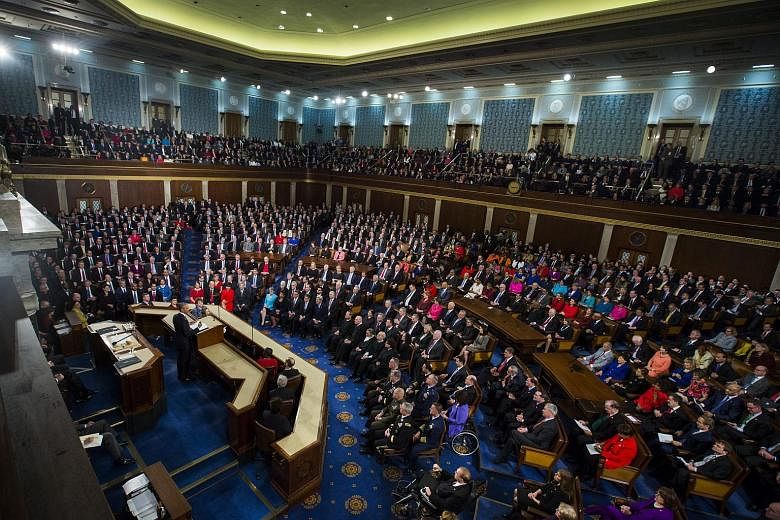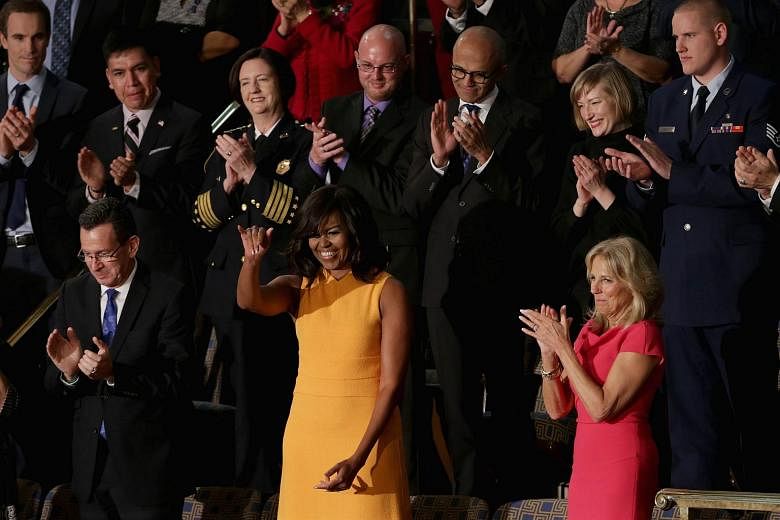US President Barack Obama used his final State of the Union address to make a strong call for America to fix its politics, seeking one more time to bridge a political divide that appears to have only worsened during his seven years in office.
And indeed, the President said his failure to deal with the growing political polarisation was one of his big regrets.
"It's one of the few regrets of my presidency - that the rancour and suspicion between the parties has gotten worse instead of better," he said towards the end of his hour-long speech before a joint session of Congress.
"There's no doubt a president with the gifts of Lincoln or Roosevelt might have better bridged the divide, and I guarantee I'll keep trying to be better so long as I hold this office."
His remarks on politics were the most powerful in the hour-long speech that departed in significant ways from his six previous State of the Union speeches. There was no valedictory list of his greatest achievements in the past year nor was there much by way of proposals for the coming year.
Instead, he said he wanted the speech to look at the future.
He said: "Tonight, I want to go easy on the traditional list of proposals for the year ahead. Don't worry, I've got plenty, from helping students learn to write computer code to personalising medical treatments for patients…
"But for my final address to this chamber, I don't want to talk just about the next year. I want to focus on the next five years, 10 years, and beyond."
He broke down the challenge facing America into four areas: giving everyone a fair shot in the new economy; using technology to solve urgent challenges; keeping America safe without becoming its policeman; and fixing the country's politics.
And it was the last part that was clearly his most powerful message and carried the strongest emotional impact. The tone of his closing remarks invoked memories of the inspirational first-term senator that swept to power seven years ago.
Before an audience that included many members of Congress, he took aim at nearly all the problems that ail Washington politics today, stressing that it wasn't just individuals that needed changing. The entire system, he said, was broken.
He said: "We have to end the practice of drawing our congressional districts so that politicians can pick their voters, and not the other way around. We have to reduce the influence of money in our politics, so that a handful of families and hidden interests can't bankroll our elections and if our existing approach to campaign finance can't pass muster in the courts, we need to work together to find a real solution. We've got to make voting easier, not harder, and modernise it for the way we live now. And over the course of this year, I intend to travel the country to push for reforms that do.
"What I'm asking for is hard. It's easier to be cynical; to accept that change isn't possible, and politics is hopeless, and to believe that our voices and actions don't matter. But if we give up now, then we forsake a better future," he added.
And he also stressed repeatedly that this was something that he would work on beyond his own tenure in the White House.
"It won't be easy. Our brand of democracy is hard," he said. "But I can promise that a year from now, when I no longer hold this office, I'll be right there with you as a citizen inspired by those voices of fairness and vision, of grit and good humour and kindness that have helped America travel so far."
He also took a clear shot at Republican presidential front runner Donald Trump for his anti-Muslim remarks.
"When politicians insult Muslims, when a mosque is vandalised, or a kid bullied, that doesn't make us safer. That's not telling it like it is. It's just wrong. It diminishes us in the eyes of the world. It makes it harder to achieve our goals. And it betrays who we are as a country," he said to loud applause.
On subjects like economy, terrorism and climate change, Mr Obama reiterated many points he has made before, albeit often with a sharper attack on his critics.
To climate change sceptics in the Republican Party, he said that such a position would soon be a "lonely" position.
"Look, if anybody still wants to dispute the science around climate change, have at it. You'll be pretty lonely, because you'll be debating our military, most of America's business leaders, the majority of the American people, almost the entire scientific community, and 200 nations around the world who agree it's a problem and intend to solve it," he said.
When talking about the fight against ISIS (Islamic State in Iraq and Syria), Mr Obama stuck by his strategy and also pushed back on the tough talk by Republican presidential candidates.
He categorically refuted suggestions that he was weak on terrorism.
"If you doubt America's commitment or mine to see that justice is done, ask Osama bin Laden," he said. "When you come after Americans, we go after you. It may take time, but we have long memories, and our reach has no limit."
And without explicitly talking about boots on the ground, he made it clear that he would not be changing his measured approach.
He said: "The world will look to us to help solve these problems, and our answer needs to be more than tough talk or calls to carpet bomb civilians. That may work as a TV sound bite, but it doesn't pass muster on the world stage.
"We also can't try to take over and rebuild every country that falls into crisis. That's not leadership; that's a recipe for quagmire, spilling American blood and treasure that ultimately weakens us. It's the lesson of Vietnam, of Iraq and we should have learned it by now."
And as with previous speeches, Asia was only given a passing mention. The only mention of the region and China was when he was pushed for Congress to ratify the Trans-Pacific Partnership free-trade agreement.
"It cuts 18,000 taxes on products Made in America, and supports more good jobs. With TPP, China doesn't set the rules in that region, we do. You want to show our strength in this century? Approve this agreement. Give us the tools to enforce it," he said.
He also ended his speech in much same way that he concluded his six previous others, by declaring the State of the Union as strong.
After highlighting a list of ordinary Americans trying to improve their lives and the lives of others, he said: "That's what makes me so hopeful about our future. Because of you. I believe in you. That's why I stand here confident that the State of our Union is strong."






